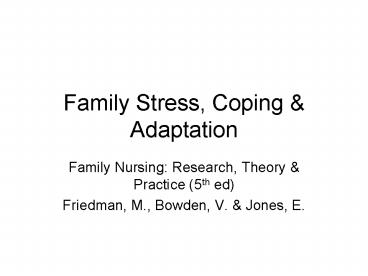Family Stress, Coping - PowerPoint PPT Presentation
1 / 24
Title:
Family Stress, Coping
Description:
Without effective family coping processes, affective, social, ... Families who coped this way do better than those with focus on sick member. Internal Strategies ... – PowerPoint PPT presentation
Number of Views:428
Avg rating:3.0/5.0
Title: Family Stress, Coping
1
Family Stress, Coping Adaptation
- Family Nursing Research, Theory Practice (5th
ed) - Friedman, M., Bowden, V. Jones, E.
2
Family Coping
- Continual demands force families to adapt in
order to survive - Without effective family coping processes,
affective, social, economic health care
functions cannot be achieved. - Nurses can assist families to adapt.
- Goal to strengthen encourage adaptive
responses reduce stressors on family.
3
Family Coping
- An active process where the family utilizes
existing family resources and develops new
behaviors and resources to strengthen the family
unit and reduce the impact of stressful life
events. (McCubbin, 1979). - A family crisis results when current resource and
adaptive strategies are not effective in handling
the stressors.
4
Family Adaptation
- Involves restructuring of family patterns of
functioning. - the process in which families engage in direct
responses to the extensive demands of a stressor,
and realize that systemic changes are needed
within the family unit, to restore functional
stability and improve family satisfaction and
wellbeing McCubbin McCubbin (1993, p.57).
5
Stressors Their Impact
- Most widely used tool to assess life changes in
families is Family Inventory of Life Events
Changes (FILE). - Families with higher scores have been found to
have lower family functioning and poorer health
(McCubbin Patterson, 1991).
6
Stressors Their Impact
- Five most stressful life events are
- (1) a child member dies
- (2) parent or spouse dies
- (3) spouse/parent separated or divorced
- (4) physical or sexual abuse in the home
- (5) member becomes physically disabled or
chronically ill
7
Family Coping Strategies
- Are stressor specific (e.g. cognitive strategy of
accepting the situation may be helpful to those
who have lost a job, but not to couples coping
with infertility). - Most harmful coping behaviors suppressing
emotions taking out feelings on others not
sharing extent of stressor with others denying,
avoiding, or running away from problems.
8
Family Coping Strategies
- Internal Strategies (from within the family)
- (1) Relationship
- (2) Cognitive
- (3) Communication
- External Strategies (outside supports
resources) - (1) Community links
- (2) Social Support systems
- (3) Spiritual
9
Internal Strategies
- I. Relationship Strategies
- Family Group Reliance (cohesiveness)
- Some families cope by becoming more reliant on
their own resources - Pulling together to weather the storm
- Establishment of greater structure (more rigid
routines) to increase control in their lives - Closing of family boundaries
10
Internal Strategies
- I. Relationship Strategies
- Greater Sharing Together
- Sharing of feelings and thoughts
- Strengthening of family cohesion
- Very high cohesion enmeshed
- Very low cohesion disengaged
- Level of cohesion influenced by culture
- Family rituals helpful (e.g. shiva)
11
Internal Strategies
- Relationship Strategies
- Role Flexibility
- Ability of mates to change or share roles when
needed is important - Flexible roles associated with better functioning
12
Internal Strategies
- 2. Cognitive Strategies
- Normalizing
- Acknowledging a chronic condition, but defining
family life as normal - View the social effects of having a member with a
chronic condition as minimal - Families who coped this way do better than those
with focus on sick member
13
Internal Strategies
- 2. Cognitive Strategies
- Reframing Passive Appraisal
- Positive outlook maintaining hope key to
resiliency - Influenced by family beliefs
- Beliefs shape how families experience and
interpret their environment - Religious beliefs play important role
- Passive acceptance of situation helpful to some
families, especially where situation inevitable.
14
Internal Strategies
- 2. Cognitive Strategies
- Joint Problem Solving
- Family able to discuss a problem, seek logical
solutions, reach consensus on what to do - Collaborative problem-solving approach
15
Internal Strategies
- 2. Cognitive Strategies
- Gaining Information Knowledge
- Increases sense of control and fear of unknown
- Provision of information a major nursing
intervention - Assisting family to use Internet effectively to
gain accurate information important nursing role
16
Internal Strategies
- 3. Communication Strategies
- Being Open Honest
- Good communication vital during periods of stress
or crisis - Communication must be direct, clear, open,
honest
17
Internal Strategies
- 3. Communication Strategies
- Use of Humor
- Humor laughter invaluable in coping can
bolster immune system
18
External Family Coping Strategies
- Maintaining Active Links with Community
- Continuing long-term associations with clubs,
organizations community groups
19
External Family Coping Strategies
- 2. Social Support Strategies
- In addition to extended family network of
health care professionals, there are neighbors,
employers, classmates, teachers, cultural or
recreational groups as potential supports - Many people dont seek needed external supports
for variety of reasons
20
External Family Coping Strategies
- 3. Spiritual Strategies
- Spiritual or religious beliefs often at core of a
familys ability to cope
21
Dysfunctional Coping Strategies
- Can temporarily reduce stress, but do not solve
the problem and have long-term deleterious
effects. - (1) Denial of Family Problems
- (2) Family Dissolution Addictions
- (3) Family Violence
22
Dysfunctional Coping Strategies
- Denial of Family Problems
- Scapegoating reduces tension in family at expense
of one member - Scapegoat becomes focus of familys problems,
hiding the real problem but results in state of
equilibrium - Scapegoat begins to take on the assigned role
internalizes it
23
Dysfunctional Coping Strategies
- (1) Denial of Family Problems
- Triangulation used to reduce tension in a dyad
by focusing on a third member - Emotional distancing creation of a façade of
cohesiveness affective communications very
limited - Extreme authoritarianism /submissiveness to
achieve family equilibrium
24
Dysfunctional Coping Strategies
- (2) Family Dissolution Addictions
- (3) Family Violence /abuse































